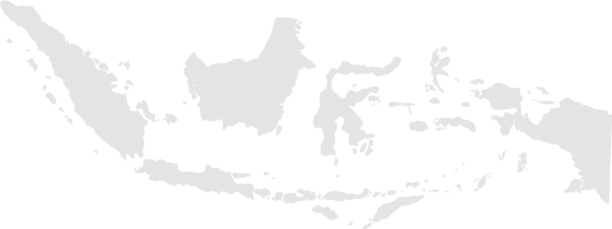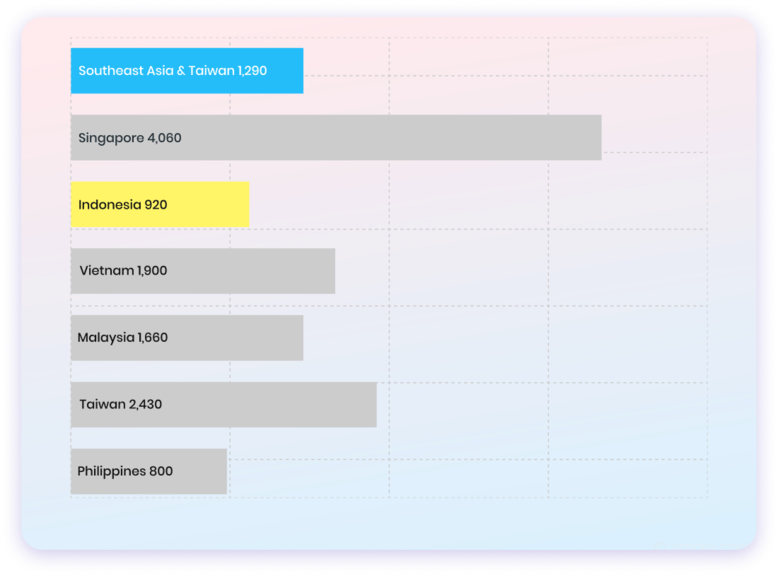


Glints Hiring Guide
Browse our hiring guide to learn more about the talent landscape, local labor laws and hiring best practices in Indonesia.

CAPITAL
Jakarta

TIME ZONE
Jakarta UTC+7

CURRENCY
Rupiah (IDR)

LANGUAGES
Bahasa Indonesia, English and others

EMPLOYERS TAX
10.24% - 11.74%

PAYROLL CYCLE
Monthly

Indonesia is the 4th most populous country in the world and boasts the largest digital economy in Southeast Asia. This means there are over 260 million young, high-potential talent that are digital natives. The country also has the most unicorns in the region. The sheer volume of talent, coupled with a thriving tech ecosystem, is ushering in a next-gen workforce who are equipping themselves with a variety of soft and hard skills to keep pace with market trends.
Top roles in demand
Full Stack Developer
Backend Developer
Frontend Developer
Sales Manager
Web Developer

Indonesia has the lowest median salary as compared to the rest of Southeast Asia. Hiring skilled tech talent is therefore economical and highly competitive with other popular offshore employment destinations.
Popular jobs and median monthly base salary
As a country with a thriving startup community, Indonesian talent are being hired remotely by employers in Singapore, Hong Kong, Australia and the US.
Median Monthly Base Salary (in IDR)
Median Monthly Base Salary (in USD)
Full Stack Developer
20,112,300
1,350
Backend Developer
14,302,080
960
Fronted Developer
13,706,160
920
Sales Manager
12,961,260
870
Web Developer
12,961,260
870
Monthly Base Salary
IDR 16,326,610
USD 1,050
IDR 12,439,320
USD 800
IDR 17,104,070
USD 1,110
Data Scientist
IDR 17,104,070
USD 1,110
IDR 11,506,370
USD 740

Looking to build teams in Indonesia? Browse more jobs and salaries in our free salary guide to keep growing.

Indonesia's work culture is one that is based on collectivist harmony and respect. They often address their seniors with salutations, even during informal situations in the workspace.
Respectful social hierarchy
Indonesians usually don’t address their superiors by their first name; instead, they add titles in front of their name when talking to them. It is polite to call senior colleagues ‘bapak/pak’ (sir) or ‘ibu/bu’ (ma'am); for example, Indonesians might address a middle-aged male senior manager as Pak [name]. Peers can be called ‘mas’, ‘mbak’, or ‘kak’.
Non-confrontational communication style
The work culture in Indonesia is peaceful with little conflict. Employees avoid talking back to their bosses, preferring to follow directions and keep them happy. Criticism is usually kept private and low-key to protect the pride of others.
Prioritize manners and gratitude
Indonesians maintain good manners at the workplace, believing a supportive, harmonious workplace is key to productivity. They also never forget their ‘thank yous’ — it’s good manners to express gratitude after receiving help from a colleague.
Strong religious influence
As a Muslim-majority country, a culture of modesty and gratitude is prevalent in the Indonesian archipelago. This influences business attire as well as office norms. Employers should provide concessions when it comes to Friday prayers, Ramadan working hours, and Eid bonus payouts.
Employment contracts here are typically fixed-term (temporary, for up to 2 years) or indefinite-term (permanent). These contracts should be drafted in Bahasa Indonesia, with the optional English format.
Each company operating in Indonesia must have their internal regulations listed down as Peraturan Perusahaan (PP). Employment contracts and PP are built on the foundation of the Manpower Law, RDS Law, and labor Union Law. Since the Manpower Law is updated frequently, employers should keep abreast of hiring developments and how they affect best hiring practices.
Contract
Holidays
Benefits
Insurance
Payroll
Bonus
Taxes
Termination

Hiring the right talent and building great teams in Southeast Asia and Taiwan can be quite a daunting task. You’ll need a deep understanding of the local talent pool, their skills, culture, and employment laws — among others.
The hiring process is often tedious, time-consuming and costly without the right approach. With Glints’ end-to-end talent solutions, you’ll have a trusted partner to lean on at every step of the hiring journey, so that you can scale up your business with peace of mind.
Not sure how to start hiring in Indonesia? Schedule a no-obligation consultation with our experts today.